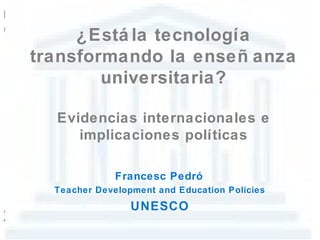
¿Está la tecnología transformando la enseñanza universitaria?
- 1. ¿Está la tecnología transformando la enseñ anza universitaria? Evidencias internacionales e implicaciones políticas Francesc Pedró Teacher Development and Education Policies UNESCO
- 5. 1940s 1950s 1960s (mediados) (mediados) 1978 1980s 1990s 2012 192019281930s 1945 ¿? Frecuencia de uso 1890 1900s 1931 1900 1925 1950 1975 2000
- 9. 1. Los estudiantes tienen hoy diferentes expectativas sobre el aprendizaje por causa de la tecnología. 2. La educació n superior tiene que cambiar radicalmente para darles respuesta.
- 11. ¿Ayudan los estereotipos? Percentage of disparities between teachers perceptions and students ’ self- perceptions. Average of 6 European countries, 2008 11
- 12. La realidad es compleja 12 Source: Ferri et al (2009)
- 13. Dos preguntas 1. ¿Realmente los estudiantes está tan n apegados a las tecnologías? 2. ¿Este apego contribuye a cambiar radicalmente sus expectativas? 13
- 14. ¿Está los estudiantes tan n apegados a las tecnologías? Sí, hay todo tipo de evidencias que así lo demuestran 14
- 15. Adopció n de tecnologías por parte de estudiantes universitarios Students Technology Own 1 Laptop 87% 2 Printer 81% 6 3 DVD Player 75% 4 USB Thumbdrive 70% 5 Wi-Fi* 67% 6 Stationary gaming 66% device 7 Ipod 62% 8 HDTV 56% 9 Smartphone 55% 5 10 Digital Camera 55% 7 11 Webcam 55% 12 12 Desktop Computer 53% 11 13 Handheld Gaming Device 38% 14 10 14 Netbook 11% 1 15 iPad 8% 3 2 4 *Likely interpreted by the respondent as having access to Wi-Fi 8 9 Traditional age college students 13 (18-24) and those from households Q1. Which of the following items do you own? of $100K+ own more technology ©2011 EDUCAUSE. CC by-nc-nd ©2011 EDUCAUSE. CCby-nc-nd 15 than their counterparts. 15 15
- 16. No es la tecnología, es la conectividad Source: ECAR (2011)
- 17. ¿Hasta qué punto está n cambiando las expectativas? No radicalmente. Se rigen por el realismo. 17
- 18. Actividades típicas en clase Q Which three of the following do you do most often in class? Copy from the board or a book 52% Listen to a teacher talking for a long time 33% Have a class discussion 29% Take notes while my teacher talks 25% Work in small groups to solve a problem 22% Spend time thinking quietly on my own 22% Have a drink of water when I need it 17% Talk about my work with a teacher 16% Work on a computer 16% Listen to background music 10% Learn things that relate to the real 10% world some activities that allow me to move Have 9% aroundmy classmates about Teach 8% something Create pictures or maps to help me remember 7% Have a change of activity to help focus 7% Have people from outside to help me learn 4% Learn outside in my school ’s grounds 3% Source: Ipsos MORI (2008) Base: All pupils (2,417)
- 19. Formas de aprender preferidas In which three of the following ways do you prefer to learn? In groups 55% By doing practical things 39% With friends 35% By using computers 31% Alone 21% From teachers 19% From friends 16% By seeing things done 14% With your parents 12% By practising 9% In silence 9% By copying 8% At a museum or library 5% By thinking for yourself 6% From others 3% Other 1% Base: All pupils (2,417) Source: Ipsos MORI (2008)
- 20. Entorno de aprendizaje preferido para la ed. superior Source: ECAR (2011)
- 21. ¿Tiene la enseñ anza online la misma calidad? Does an online course have the same educational value as an in-person course? Online courses provide eq ual value Age <25 23% 25+ 40% Live on-campus 18% off-campus 33% Taken an online course Yes 45% No 12% Source: ECAR (2011)
- 22. ¿Qué piensan acerca del papel de la tecnología? A vg. Agreement with Statements Gives Students Access to Resources and Progress Reportstrack my academic progress Easy to Gives me access to resources Helps me know how I am doing Easier to get help when I need it Simplifies administrative-related activities Makes Students More Efficient do my work faster Helps me Efficient way to store examples of Allows me to produce higher-quality work work Makes college easier Facilitates Connecting with Others Feel connected to other students Feel connected to what's going on Feel connected to professors/staff Gives me access to experts in my field Makes Learning More Engaging and Relevant Learning more creative More relevant to real life Take control of own learning Learning more fun More engaging Extends learning beyond Think out of the box Elevates teaching classroom Individualized/personaliz Reach academic potential Prepares me for the workforce ed Prepares me for graduate school ©2011 EDUCAUSE. CC by-nc-nd 22
- 24. ¿Cómo están respondiendo las instituciones? 24
- 25. ¿Cómo están respondiendo las instituciones? Percentage of Search engines university teachers using Learning management system different Online communities services. Subject/discipline databases Australia, 2009 News reader/aggregator Podcasts Blogs Other Video sharing Social networking websites Digital learning objects Social bookmarking None of the above 0 10 20 30 40 50 60 70 80 90 100 25
- 26. 26
- 27. 1.
- 28. 2. Conveniencia
- 29. 3. Productividad
- 30. 3. Productividad
- 31. No es la tecnología! •Necesidades educativas •Solución pedagógica •Viabilidad costes
- 33. Muchas gracias F.Pedro@UNESCO.org Ya disponible en: /francescpedro Más en: @FrancescPedroED /francesc.pedroED
